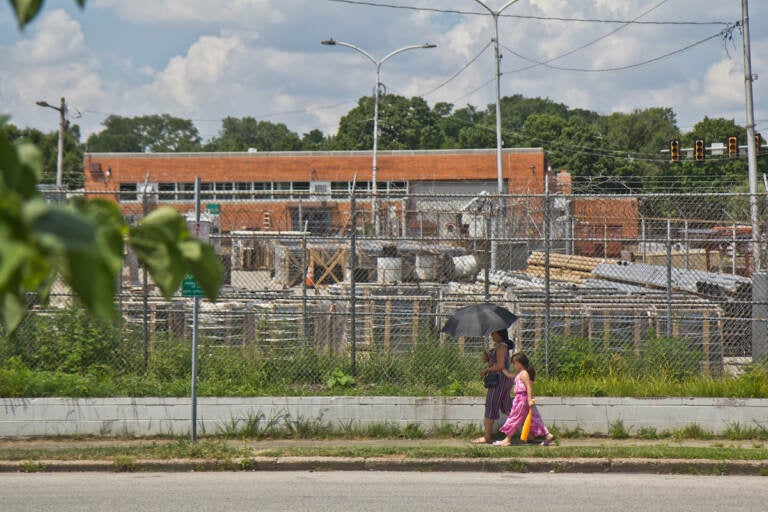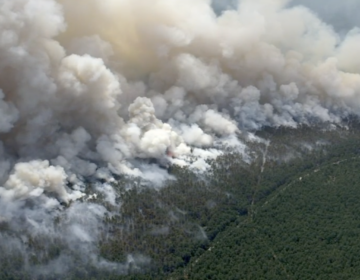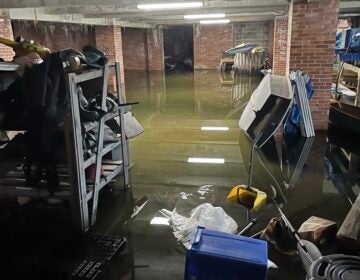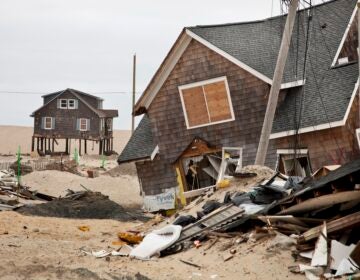The Philadelphia region remains under drought watch. Here’s what you need to know
The Philadelphia area is facing record dry conditions. Meteorologists say months of rainfall is needed.
Listen 1:27
File photo: A woman uses an umbrella for protection from the sun in the Juniata Park section of Philadelphia during a heat wave on July 20, 2022. (Kimberly Paynter/WHYY)
From Philly and the Pa. suburbs to South Jersey and Delaware, what would you like WHYY News to cover? Let us know!
The Philadelphia region is facing a drought watch after experiencing record-low rainfall in October and very little rainfall in September.
Officials across Pennsylvania, New Jersey and Delaware are encouraging residents to voluntarily conserve water as little relief to the dry spell is expected in the coming days.
The dry conditions have also increased the risk of brush and forest fires, prompting environmental agencies in the region to issue bans on open fires, such as bonfires.
Firefighters in New Jersey have been battling a number of fires across the state — most recently in South Jersey’s Wharton State Forest — which are spreading quickly because of drought conditions.
Record dryness
The Philadelphia region has faced an extremely dry period since September, and October was the driest month on record for much of the area. The last time the region faced such severe drought was in 2002.
Droughts are more likely to develop with persistent dry weather patterns, said Steve Seman, professor of meteorology and atmospheric science at Penn State University.
“We’ve had many areas of high pressure that have been persistent over the eastern United States, and that has allowed dry air from Canada to really dominate, and there’s just not a lot of opportunities for very widespread rainfall,” said Seman.
Philadelphia alone has gone without rain for 38 days, breaking the 29-day record set in 1874 for the most consecutive days without rain, according to the National Weather Service. Less than an inch of rain has fallen in the city since August. Delaware and New Jersey have experienced similar record dryness.
“This is not something that happens all the time. This is once in a generation, or less than once in a generation, type dryness over that period of time,” Seman said.
The call to conserve water
The Pennsylvania Department of Environmental Protection is encouraging residents and businesses across the state to voluntarily reduce their water use by 3 to 6 gallons daily — that’s the equivalent of running a kitchen faucet for three to seven minutes.
The advisory comes amid a drought watch in 33 counties, including in the Philadelphia area. Berks and Schuylkill counties, both of which are currently under a drought warning, have faced more consistent dry conditions.
Some public water systems have implemented their own conservation measures. For instance, Audubon Water Company in Norristown is requiring customers to conserve water because its wells are at “critically low” levels.
Most Pennsylvania residents affected by the drought watch receive most, if not all, of their drinking water from groundwater sources.
Philadelphia residents get their drinking water from the Delaware and Schuylkill rivers. The Philadelphia Water Department on Friday said reservoirs currently are in good condition, but voluntary conservation may prevent serious shortages should drought conditions persist.
Delaware residents also are asked to conserve water, particularly in New Castle County, where residents rely on streams and reservoirs for their water supply.
Officials in the state say reservoirs and aquifers are currently in good shape. Since the last severe drought in 2002, more than 2 billion gallons of water reserves have been built. However, officials say voluntary conservation could maintain the existing water supply if conditions worsen.
Officials are also encouraging residents to conserve their water use in New Jersey, where below-average rainfall and above-average temperatures have led to diminished streamflow, reservoir and groundwater levels.
The Delaware River Basin Commission, which regulates water supply along the Delaware River, is holding a hearing next week to hear input from residents and stakeholders as it considers declaring a “water supply emergency” if conditions worsen.
How to conserve water
Taking shorter showers can help during a drought watch, experts say. Residents should also turn off their faucets when brushing their teeth, and only run full dishwasher and laundry loads.
Experts also advise homeowners to fix leaking faucets and running toilets, and consider purchasing low-flow showerheads, faucets, and toilets that can help to conserve water.
Instead of dumping an unused glass of water down the drain, residents can use it to water their houseplants.
These changes could save a gallon or two of water a day, said Dave Robinson, the New Jersey State Climatologist at Rutgers University.
“With millions of people in this area, that’s not trivial,” Robinson said. “But it is challenging in this era of low-flow toilets, washing machines and dishwashers to conserve water. It’s much easier to turn off the tap to your garden and to your lawn in the middle of summer than it is now. But there are still efforts we can make to better conserve our water, and we may be asked to do more in the days, and weeks and months ahead.”
Fuel for fire
Delaware, New Jersey and much of Pennsylvania are under burn bans, and residents are asked to not build bonfires, set off fireworks or drop their cigarettes on the ground.
The forecasted fire danger is high in much of Pennsylvania and New Jersey, while the risk is “extreme” in South Jersey, which missed the early August rains and has sandy soils that can dry out faster.
Gusty winds and dry leaves fueled the risk of brush fires, grass fires and wildfires in the region over the weekend. In Pennsylvania, firefighters are containing a brush fire at Blue Mountain in the Lehigh Valley that sparked on Saturday. In South Jersey, firefighters have been working to put out a fire at Wharton State Forest since Monday.
Since Oct. 23, New Jersey’s Forest Fire Service has responded to 238 wildfires. That’s more than eight times greater than the same period last year, according to the New Jersey Department of Environmental Protection.
“We’re in a very precarious position right now, not just in the Pinelands, but throughout the mid-Atlantic region, even in deciduous forested areas,” Robinson said. “The leaves are on the floor, there’s a lot of fuel, and things could get really worrisome and dangerous very quickly.”
No relief soon
The region may see a few showers Wednesday night into Thursday, which won’t bring much relief, said Paul Fitzsimmons, lead meteorologist with the National Weather Service in Mt. Holly, New Jersey. There may be some meaningful rainfall from late Sunday into Monday, but it’s too soon to predict how much. That doesn’t mean an end to the drought watch, however.
“We’re now in quite a deficit of precipitation, so even if we were to get a half inch, or inch of rain, that would help, but it’s going to take a little bit more than that to make up the deficit we’re in,” Fitzsimmons said.
Robinson said returning to a normal pattern of 3 to 4 inches of rain a month will moisten the soils, elevate groundwater levels, improve riverflow and raise reservoirs. He said now is a crucial time of year to do so, and to prepare for increased water use during the summer months.
“We recoup that loss in the winter, but we’ve got a lot of recouping to do this year, and we’re going to need ample rain or come next April and May, we’re going to have concerns going right into the summer,” Robinson said. “The best news about this drought that we’ve been experiencing is that it has come at the end of summer, at the end of the growing season, and with that, the immediate impacts aren’t as extreme as they would have been had we been talking now in July or August.”
If conditions become more severe, officials in Pennsylvania, New Jersey and Delaware could issue a drought emergency, under which restrictions on water use could be implemented.
Most droughts in the region have been short-lived over the last two decades, remedied by normal or excessive rainfall, Robinson said.
“We’re going to need multiple inches of rain, hopefully in a very timely fashion, not all at once,” he said. “Then we can start looking to ease back and breathe a little sigh of relief.”

Get daily updates from WHYY News!
WHYY is your source for fact-based, in-depth journalism and information. As a nonprofit organization, we rely on financial support from readers like you. Please give today.






